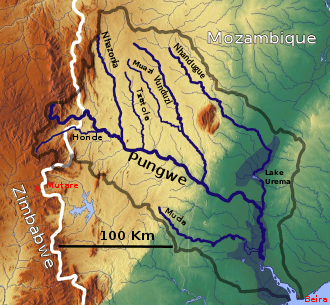Honde River
Honde River pronounced Horn-de is a river in Eastern Highlands of Zimbabwe which runs through the Honde Valley.[1] It flows from Mount Inyangani on the western edges of Honde Valley where it is joined by several of its major tributaries: the rivers Mupenga, Buu, Mtarazi and Ngarura. It deposits its waters into the Pungwe River which in turn empties in the Indian Ocean.

Mtarazi Falls, Zimbabwe's highest at 762m flows into the Honde south of Pungwe Gorge at the Honde River valley just outside Nyanga National Park. Parts of the Honde in the southern Nyanga support lush vegetation, the closest Zimbabwe has to Jungle.[2] Further south, the Honde river provides water for communal irrigation in an otherwise dry area.[3] The 500 square kilometres of the Honde Valley in Zimbabwe are extensively cultivated, often with gravity fed irrigation channels. Extensive use is made of the many smaller tributaries feeding into the river in this portion of the Honde Valley.[4]
The Honde River forms part of the Mozambique-Zimbabwe border before flowing into Pungwe river which finally empties into the Indian Ocean at Beira.[5]
References
- zimparks.com: Nyanga Park Archived 2008-10-26 at the Wayback Machine.
- Hiking Zimbabwe's Highest Mountain: British Airways Travel Guide. "take a path down into the dense vegetation of the Honde River, the closest there is to jungle in Zimbabwe."
- Nyanga - a living treasure map. PATTIE PINK, The Zimbabwean, August 2005.
- Working Paper No. 32. Assessment of the Potential for Non-motorised Irrigation of Small Farms from Streams in Manicaland, Zimbabwe. Development Technology Unit. Department of Engineering, Warwick University, Coventry (January 1991)
- 1988 Global Register of Extreme Flood Events. Dartmouth College, 2003.
External links